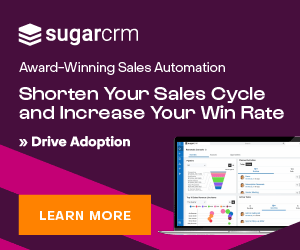You’ve probably heard that automation helps both marketing and sales teams do their jobs—but that doesn’t mean they’re interchangeable. Does marketing automation serve a different purpose than sales automation? Yes. Can the two solutions exist in one solution? Also yes.
While marketing software and sales automation tools exist for different purposes, they’re both geared toward achieving the same goal: winning new customers. Let’s have a deeper look at marketing automation software’s role, how sales automation platforms differ, and which one your team needs to succeed.
What is Marketing Automation?
Marketing automation software generates new leads for a business by streamlining the creation, management, and analysis of marketing campaigns in the environment. It takes the hassle out of tedious campaign processes like email marketing and lead scoring while tracking web and email interactions. Through automatic tracking, scoring, and pre-set rules, marketing automation allows marketers to send hyper-personalized messages to prospects at scale. This increases prospect engagement and lead qualification prior to handing them off to sales.
Marketing automation platforms benefit teams by tracking and capturing prospect activity, nurturing and scoring new leads, and creating more marketing qualified leads (MQLs) to equip sales to win new business in the comparison. The most common marketing automation features include:
- Email marketing. Easily create personalized, responsive email campaigns with optional dynamic content to spark conversations that convert.
- Journey tracking. Uncover key insights about prospect and customer engagements with your website.
- Nurture campaigns. Remain top-of-mind with automated, tailored messages sent to prospects throughout their customer journey.
- Predictive lead scoring. Measure engagement and prioritize sales outreach with actionable lead intelligence.
- Social. Schedule social posts, manage accounts, and monitor brand reputation across social media platforms.
- Landing pages and lead forms. Use drag-and-drop builders (or choose to code your own) to quickly build custom web pages and forms that capture leads.
- Reporting and ROI. Capture actionable insights from your marketing performance to understand what’s driving revenue with interactive dashboards and shareable reports.
- CRM integrations. Align sales and marketing with integrations that include real-time syncs, lists, and support for custom fields.
When to Use Marketing Automation
Marketing automation serves the purpose of attracting new prospects with engaging content and optimizing lead flow for the sales team. To do this, marketing teams create and distribute educational content tailored to each stage of the sales funnel. Marketing automation software assists in attracting, capturing,
Because of this, marketing automation software is applicable at every stage of the customer journey. In smaller or newer organizations, both marketing and sales may use marketing software.
Common Mistakes of Using Marketing Automation
Marketing is often the gatekeeper to the rest of the organization. If your marketing team brings in sub-par leads, it affects the whole sales cycle. That’s why proper scoring and nurturing with a leading marketing platform is critical.
Be careful not to let your marketing campaigns go stale, either. Make sure they’re loaded with fresh, engaging content that your target audience wants to read. Continuously run A/B tests to ensure you’re optimizing your chances for conversion.
Finally, set your organization up for marketing automation success by integrating all the systems you use most frequently. Failing to do so will result in manual data input, inaccurate records, and low user adoption from employees who are sick of switching between systems.
What is Sales Automation?
Sales automation is software that helps reps move leads through the sales cycle by automating repetitive tasks that detract from selling. CRM software is the most common sales automation solution, helping reps focus on the right leads and opportunities with features like:
- Lead management. Give everyone in the organization complete context for each customer interaction and insight into what to do next.
- Pipeline management. Get visibility into your entire pipeline across all opportunities and how close they are to becoming new customers.
- Intelligent lead prioritization. Prioritize leads based on AI-powered lead-conversion scores.
- Advanced forecasting. Understand how your pipeline, quota, forecast, and attainment evolve over time with advanced visualizations, notifications, and automatic alerts.
- Business process management. Define, design, and standardize complex business processes with automation.
- Guided selling. Create play books and templates for sales plays, sales methodologies, guided selling, lead nurturing, and more.
Using these tools helps your team boost productivity, increase lead-to-sale ratios, reduce costs per sale, shorten the sales cycle, and gather more insightful data. More than that, sales automation features give you time back to spend on more important activities like building customer relationships.
When to Use Sales Automation
Sales automation software is used to close deals, not gather leads. It helps teams work with the leads marketing has already generated to track scores and move deals along the pipeline. The brand materials sales uses at this stage are for following up after phone calls with leads who are further down the funnel—not educating the general audience.
You may not need sales automation right away if your company is just starting out. However, advanced teams will find that the combination of marketing and sales automation helps optimize their performance by tracking a wider range of metrics and employing AI to predict outcomes.
Common Mistakes of Using Sales Automation
One of the biggest mistakes new sales automation users make is choosing to automate the wrong steps in the process. Automation works best when it alleviates mundane, repetitive tasks—not the ones that build relationships or showcase your brand. Easily automate tasks like scheduling meetings or sending follow-up communications after meetings. Don’t skip the human aspects of the sales process that make your organization unique.
Secondly, don’t make the mistake of confusing automation for never touching it again. A sales automation platform makes your team’s job easier, but it should never dictate your strategy. It should help you to regularly track lead progression, keep contact data clean and updated, and ensure the system is helping you reach your goals. Otherwise, your team and ROI may suffer.
Is it Sales vs Marketing?
The SugarCRM platform seamlessly brings marketing automation and sales automation together in one, easy-to-use system. With Sugar Market, marketers can adequately feed the funnel while working closely with sales to build pipeline. ?Sugar Sell provides next-generation sales automation that determined teams need to ?accelerate the sales cycle and increase their win rate.? Whether you’re ready for one or both, Sugar is the platform that does the hard work for you so you can get back to building customers for life.
See Sugar Market and Sugar Sell in action by watching a demo today.






